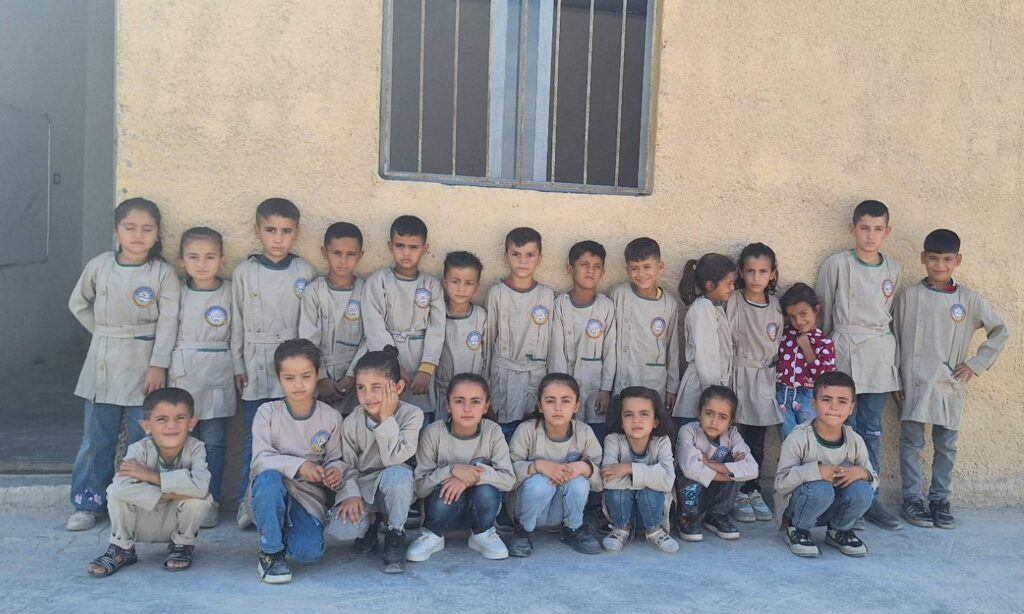Al-Hasakah – Majd al-Salem
At the beginning of each academic year, people displaced in the Twainah camp north of al-Hasakah face recurring problems and challenges in their quest to find suitable education for their children and secure their necessities.
Displaced people in the camp, which hosts 16,000 persons, suffer from difficult economic conditions that hinder their children’s education, with only three schools available and no fundamental solutions, according to Omar Alawi (45 years old), a resident of the camp.
Alawi told Enab Baladi that the poor economic condition of the displaced people, the lack of job opportunities, and the lack of support from concerned parties or organizations deprive children of good educational opportunities.
Alawi has two children in elementary school, one in the fourth grade and the other in the sixth grade, and preparing each of them costs about one million Syrian pounds (65 US dollars) for clothing, a bag, and stationery. Alawi works in a construction workshop outside the camp with a daily wage ranging between 35 and 50 thousand Syrian pounds (4 dollars).
Despite this, Alawi strives hard to educate his children and to secure what they need, even if it means borrowing money. However, some cannot afford this and send their children to work instead of school.
Elementary schools to eliminate illiteracy only
According to what Enab Baladi learned from displaced people in the camp, there are three schools with 18 prefab classrooms, designated only for the elementary stage.
Ms. Amina Mustafa (48 years old), a resident of the camp, said she faces difficulty in securing a school for her daughter in the seventh grade, as there is no regular school for the preparatory stage in the camp so far, and all they provide is two hours only for students at this stage, forcing her to find a solution for her daughter’s continued education in the city of al-Hasakah.
Ms. Mustafa added to Enab Baladi that having students go outside the camp daily to attend schools in al-Hasakah is very exhausting and costly for the students and their families, as the camp is about 13 kilometers away from the city.
This situation has led to hundreds of students dropping out and not completing their education, and a wide segment of parents have lost hope for a higher level of education for their children and only want to eradicate illiteracy and teach their children basic arithmetic without any further aspirations.
Transportation costs and difficult roads
The minibus fare from al-Hasakah city to the camp is 3000 Syrian pounds, so a student needs 6000 Syrian pounds daily (round trip) as a fare, not including personal expenses, while the fare for a taxi is 100 thousand Syrian pounds (round trip).
The difficulty of traveling to and from the camp is not limited to the cost only. There are difficulties, especially during the winter, such as the deteriorating infrastructure of roads inside and outside the camp, and the presence of water and mud puddles, which means students miss many school days.
Parents reject AANES’ curricula
Organizations provide little support to the educational process inside the camp, limited to sometimes distributing stationery or organizing recreational activities.
Another problem in the camp is that the displaced people want to educate their children in schools away from the ideology of the Autonomous Administration of North and East Syria (AANES), and there are many cases where parents refrain from sending their children even when there is an available opportunity for education.
An employee working with an active organization in the camp said that displaced people secretly teach their children the “regime’s government’s curricula” because AANES prohibits teaching or conducting courses for those curricula inside the camp. He added that those who wish to enroll their children in other schools must go outside the camp.
Due to the number of students and the few schools, it is difficult to implement a full school day, as the camp schools adopt a system of shifts, with two hours per class.
On the other hand, there are complaints from camp residents about the teaching staff, indicating that the teachers are unqualified and do not have university degrees.
Enab Baladi contacted the Education Committee in the Camps affiliated with the Autonomous Administration to inquire about the reality and conditions of the educational process and schools in the camp, but it did not receive any response to its inquiries.
Mohammad Hajjo, the spokesperson for the educational complex in the camps, mentioned in a previous statement to the Ronahi newspaper affiliated with the Autonomous Administration that the three schools in the camp accommodate about 330 male and female students, distributed among one school for preparatory and secondary stages and the other two schools for elementary students.
He said that the system followed in these schools is a shift system (morning and evening), and the education sector in the camp suffers from weakness and neglect from international organizations and concerned parties.
The Twainah (Washokani) camp is located 13 kilometers northwest of al-Hasakah and is managed by the Autonomous Administration. It accommodates 16,876 people, distributed among 2,377 families, most of whom come from the city of Ras al-Ain and its southern countryside, as well as from the town of Abu Rasin and its countryside, and the northern and northwestern villages of Tal Tamr.

